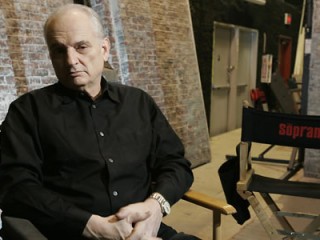
David Chase biography
Date of birth : 1945-08-22
Date of death : -
Birthplace : Mount Vernon, New York, United States
Nationality : American
Category : Arts and Entertainment
Last modified : 2010-08-30
Credited as : Film director and television producer, writer, created the drama series "The Sopranos"
0 votes so far
David Chase is the creator of HBO's acclaimed series The Sopranos, the continuing drama of a fictional organized crime family in New Jersey and its associates. It has been called "ruthlessly emotional, cuttingly funny and frightening," by Entertainment Weekly television critic Ken Tucker, while Nation writer Ellen Willis termed it "the richest and most compelling piece of television--no, of popular culture--that I've encountered in the past twenty years."
Became Respected TV Writer
Chase is of Italian-American heritage himself: his family name of De Cesare was changed to Chase in the 1920s. He grew up in the north New Jersey area, where much of The Sopranos takes place, as the son of a hardware-store owner. He studied film at Stanford University, hoping to become a movie director. "I thought that maybe one day I would get to smoke Gauloises and make dark enigmatic little pictures," he told the New Yorker's David Remnick.
Instead, he found work in the soft-core pornography industry, while writing a total of nine scripts for mainstream films, none of which were ever produced. Along the way Chase accrued a wife, daughter, and therapist. Though he eventually graduated to television, working as a writer and producer for The Rockford Files, Northern Exposure, and I'll Fly Away, he remained dissatisfied with his life. "I felt cowardly," he recalled in the interview with Remnick. "The most important piece of career advice my wife gave me was, If it's fulfilling for you, do it. And I mostly have not followed that."
Tinkered with Classic Mob Story
A fan of the mob-movie genre since his youth, Chase wanted to create a version of the well-mined milieu unlike any other. As he told Newsweek's Marc Peyser, he believed that too many television shows revolve around "lawyers and cops and courts . Wise-guys don't all go to jail or get killed. In reality, they play cards and go to social clubs and pick up money. They do a lot less than we portray them doing." He originally developed The Sopranos for the Fox network in the mid-1990s, but executives decided against producing it. It was sold to HBO instead, and debuted in January of 1999. "None of us ever expected anybody to watch the show," Chase remarked in the interview with Peyser. But the show was an immediate hit: after the first two episodes, HBO signed Chase to a contract for a second season, the quickest renewal in the cable channel's history.
The Sopranos is centered around Tony Soprano, a mob boss played by James Gandolfini. He has a lavish home, a devoutly Catholic wife, and two teenaged children. Plagued by anxiety attacks, he regularly visits a psychiatrist, Dr. Jennifer Melfi (Lorraine Bracco), who prescribes an antidepressant for him. Soprano faces a myriad of problems in his business world, which are further complicated by Federal Bureau of Investigation attempts to nail the group. In one primary storyline, Soprano's formidable mother, Livia (Nancy Marchand), is angered when her son relegates her to a deluxe retirement community, and tries to have him killed. "What kind of person can I be," Soprano asks his wife, "where his own mother wants him dead?" Chase said that the character of Livia was based on his own mother. "My mother was so downbeat, so relentlessly pessimistic and that, in Livia, all comes from her," he told Remnick in the New Yorker.
A Critical Hit
In its first season, some episodes of The Sopranos attracted a viewing audience of 10 million, setting a record for an HBO original series. It also won a slew of critical accolades and 16 Emmy nominations, taking four including a writing award for Chase in which Tony takes his daughter to visit a college in Maine, and discovers an FBI informant along the way; he murders him with an electrical cord before picking his daughter up after her tour. Chase's creation of a stressed mob boss on Prozac helped make the show a hit. "I think it accurately conveys that most of these guys spend every day with a knot in their stomach," former FBI agent Bruce Mouw told Newsweek. "It's not a happy, fun life." Willis, writing in the Nation, described the show as "a deft depiction of class and cultural relations among various subgroups and generations of Italian-Americans [and] a gloss on the manners and mores of the fin- de-siecle American middle-class family."
Some Italian-American groups, however, objected to the depiction of the show's characters and their lifestyles, claiming The Sopranos portrayed their ethnic group in an unfavorable light. Officials in Essex County, New Jersey, even refused to allow the show to film there. Chase dismissed the criticism as unwarranted. "This is a story about America," Chase said in the interview with Peyser. "Anybody who watches it with any degree of intelligence understands that right away . The show poses really hard questions about responsibility and even about what it's like to be alive in this big, cold universe," Chase asserted. "But most people don't want to be bothered with those questions."
Slated for Burial
Chase retains tight creative control of the episodes, greenlighting everything from the script to the final soundtrack. He requested a four-year cap on the lifespan of The Sopranos, however, and the show will likely end after the 2002 season. He plans to make his first film, a project backed by HBO, about the Christian rock-music scene.
AWARDS
Co-winner of an Emmy Award for writing, Academy of Television Arts and Sciences, 1999, for an episode of The Sopranos.
















